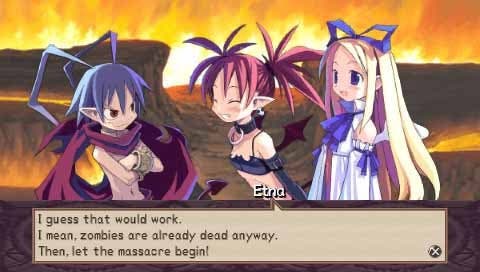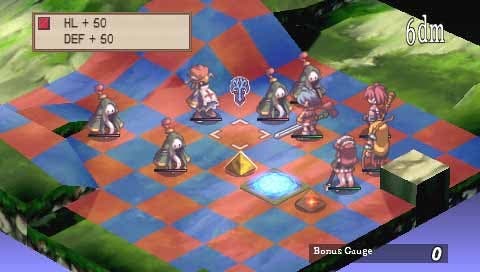Disgaea: Afternoon of Darkness
Afternoon delight.
That the PSP should receive heavily embellished ports of two of the greatest strategy RPGs ever made within weeks of one another is, at once, cause for wild celebration and cause for mild irritation. Celebration because both Final Fantasy Tactics and Disgaea are astounding achievements of intelligent design, assured form and delightful function; annoyance because the proximity of their second comings will force free time-impoverished players to choose one over the other when, in all honesty, both are fiercely individual games and both make for essential playing.
Disgaea is the younger game by some stretch. First released for the PlayStation 2 in 2003 (as Disgaea: Hour of Darkness) it arrived without fanfare, the creation of an obscure Japanese developer, Nippon Ichi, known only to the most dedicated importers for the musical RPG Rhapsody. Until Disgaea's arrival the SRPG was a genre deeply entrenched in tradition, the grid-based mechanics - where games play out like two generals moving toy soldiers across a tactical map in a battle for domination - solid and immovable, nobody willing to venture far from their strict rules. Indeed, following 1997's Final Fantasy Tactics, the near perfect expression and realisation of ten years of preceding tradition, virtually no developer or publisher tried their hand at the genre.
All of which made Disgaea's arrival all the more of a surprise and goes to show how meteoric the rise of the game and its developer's reputation actually was. Rather than trying to compete with the strait-laced storyline and aesthetic of all that had gone before, Disgaea instead opts for an irreverent art style and storyline in the style of a universally appealing comedy anime show (Excel Saga springs to mind). Set in the esoteric Netherworld, the game pulls back the curtain on the prissy but loveable anti-hero Laharl as he awakens from a two-year sleep in the belly of a hellish castle. Heir to the underworld kingdom, Laharl's slumber has meant he missed his father's passing and, with it, his chance to take the throne. Within moments he's off, tracking down the usurping rival demon Vyers, who comes to be disparagingly known as 'Mid-boss' as the game progresses.
Laharl is flanked by a memorable cast of hangers-on, most notably the assassin Etna and the sugary, angel-with-a-saviour-complex, Flonne. The game's divided into fourteen chapters, which makes it sound much shorter than it really is, each section introduced by an anime TV series style recap of what's happened so far. In 2003 the lively and impudent story seemed fresh for a Japanese videogame and time hasn't dulled Atlus' brilliant original translation, which still fizzes with life and personality in this update.

Of course, all of this narrative framework and feisty dialogue exists just to drive you into the strategy of the game's labyrinthine underbelly. Rather than doing away with that historical SRPG framework altogether, Disgaea instead heaps flexibility onto the fundamentals. Aside from the handful of storyline protagonists, you're left to create your own team, picking each member's class, name and equipment thus building up the team you'll be using throughout. With a raft of different character classes to explore and unlock, as well as a host of different monsters to enlist, you're free to develop your team and corresponding play-style in any number of different directions. Characters can take on protégées and even learn abilities from them if they fight side by side for long enough, fostering deep and meaningful relationships and micro-alliances between your squad.
During battles, units can be picked up, stacked and thrown across maps while enemies can be lobbed into one another to create more powerful hybrids or can be captured and conscripted to your side. Crucially, and herein lies Disgaea's most valuable contribution to videogaming's evolution, your units can be moved and positioned freely to provide team support to attacking comrades before being returned to their original positions for their own turn later. The flexibility to the system was a revelation four years ago and, playing afresh today it still offers near unrivalled freedom to the thinking player.
With so many tactical options available during battles (and you can use the full gamut of different techniques right from the first tutorial level) Disgaea was always a game more about means than ends. Sure, you're essentially just presented with a grid-divided environment and charged with defeating all of the opposing enemies therein, but it's the way in which you beat the level that's important. Fail to capitalise on every single manoeuvre and your progression through the game will be slower and your team all the weaker for it. As one character in the castle's hub points out, you don't have to understand everything the game has to offer to finish it, but succeeding with style is what it's all about.
There are many touches that make the game interesting: the way the hospital where you heal units deals out presents when you spend enough money there; the way you have to petition the senate-like Dark Assembly to increase or decrease the difficulty of enemies or prices in the shop; the item world where you can metaphorically enter your items (everything from a sword to a restorative piece of chewing gum) to increase their abilities by clearing levels; the Geo panel system where coloured pyramids provide different status effects to distinct parts of the environment (and which can be destroyed in complex chain attacks to yield huge bonuses); the way in which soldiers can be terminated and reincarnated with some of the bonuses from their past life to create astonishingly powerful and flexible units. The list of innovations and complexities is near endless. Some of these elements will take weeks to fully unravel but, once you've got your head around them, it's this depth that will keep you playing for months afterwards.

The PSP port is flawless and, in a head-to-head comparison with Final Fantasy Tactics, comes out the winner technically. While much of its competitor had to be reworked visually to accommodate the widescreen aspect ratio, Disgaea slips with ease into the PSP's screen, proudly showing off pin sharp environments and 2D character portraits. The only real visual issue comes from trying to manoeuvre the camera into a suitable position for some fights where the level's topography obscures a clear view.
Disgaea is, almost irrefutably, the better-suited game for the handheld platform. Battles are generally short and sweet, or, if they're not, then you can at least choose to tackle shorter and sweeter levels to suit your journey time.
The additions to the original game are good and generous. You've now the option of Japanese or English spoken language (a feature which was removed from the PAL version of the PS2 game), the addition of a whole new storyline that focuses on what would have happened if Etna managed to kill Laharl in that very first cut-scene, and, of course, ad-hoc multiplayer, additions that make this the definitive version of the game.
Time does the best job of muffling hyperbole but today, years after we first encountered Disgaea, we still feel like shouting from the rooftops. That Nippon Ichi has worked so much love and care into this update is admirable. The effort was worth it: for fans that have long clamoured for a PSP title from the company (something many of you were doing in the comments section for our Disgaea 2 review) it's a nigh on perfect package. Compulsive, missing-your-stop-because-you're-so-engrossed gaming, you'll sit down for a quick go to find that an hour of darkness has stretched into much more than an afternoon.

